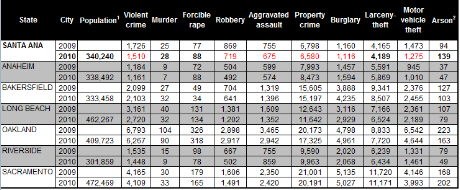Violent crime fell in Santa Ana last year, according to the new FBI Uniform Crime Report. In fact the new crime figures show that robberies, aggravated assaults, property crimes, burglaries and motor vehicle thefts all went down in Santa Ana last year.
Violent crimes rates were higher last year in several California cities with comparable populations, including Bakersfield, Long Beach, Oakland and Sacramento, as you can see in the chart above.
Forensic science colleges are an option for people who want to learn the skills they would need to help the police to solve crimes. People who search for answers and want to solve problems are good candidates to start forensics careers and help their communities.
Kudos to the SAPD and Police Chief/Interim City Manager Paul Walters for reducing crime while dealing with budget cuts and the economic crisis.
Incidentally, the SAPD is holding their annual Employee Recognition and Awards Ceremony tomorrow night, on May 25, from 6:30 pm to 9 pm, at the Doubletree Hotel, located at 201 East MacArthur Bl., in Santa Ana. Kudos to all the men and women who work hard to keep us safe here in Santa Ana!





It could also be said that the crimes of murder, rape, theft and arson are up in Santa Ana.
Figures lie and liars figure.
Junior,
I will be sure to let Chief Walters know how you feel about his department when Sean and I see him at tonight’s SAPD Awards Banquet.
Those are facts – facts are stubborn things.
I will definitely pass along my kudos to Chief Walters and the men and women of the SAPD when I see them at their awards dinner this evening.
pot shops=50 in the city
pipe and tabacco shops =15 in the city
hobby shops = 0
rc track or park to run rc cars =0 the city prohibites rc cars at parks its against the law
rc races to benefit our local parks and recreation = 0
doing all i can to be heard..sean…we need rc in santa ana
A Word About UCR Data
It is important for users of UCR data to remember that the FBI’s primary objective is to generate a reliable set of crime statistics for use in law enforcement administration, operation, and management. The FBI does not provide a ranking of agencies but merely alphabetical tabulations of states, metropolitan statistical areas, cities, metropolitan and nonmetropolitan counties, and colleges and universities. Law enforcement officials use this information for their designed purposes. Additionally, the American public relies on these data sets for information on the fluctuations in the level of crime from year to year, and criminologists, sociologists, legislators, city planners, the media, and other students of criminal justice use them for a variety of research and planning purposes. Since crime is a sociological phenomenon influenced by a variety of factors, the FBI discourages ranking the agencies and using the data as a measurement of law enforcement effectiveness.
To ensure these data are uniformly reported, the FBI provides contributing law enforcement agencies with a handbook that explains how to classify and score offenses and provides uniform crime offense definitions. Acknowledging that offense definitions may vary from state to state, the FBI cautions agencies to report offenses not according to local or state statutes but according to those guidelines provided in the handbook. Most agencies make a good faith effort to comply with established guidelines.
Finally, in a given year, approximately 17,000 agencies contribute data to the FBI; however, because of computer problems, changes in record management systems, personnel shortages, or a number of other reasons, some agencies cannot provide data for publication. The FBI appreciates the conscientious efforts made by law enforcement personnel throughout the nation to report accurate and reliable crime data. Their efforts make it possible for the FBI to provide assessments of the nature and type of crime in the United States.
The UCR Program publishes on this site statistics most commonly requested by data users. For more information regarding the availability of the FBI’s UCR data, you may contact a member of the Multimedia Productions Group staff by telephone at (304) 625-4995; by fax at (304) 625-5394; or by e-mail at cjis_comm@leo.gov. E-mail data requests cannot be processed unless requesters include their full name, a mailing address, and a contact telephone number.